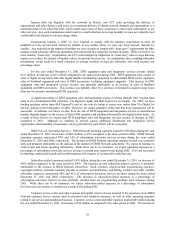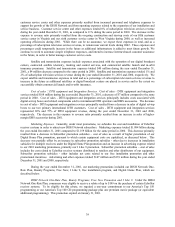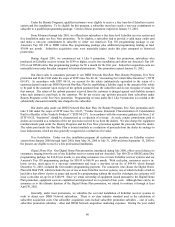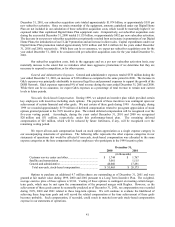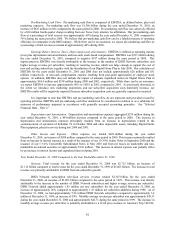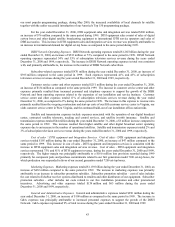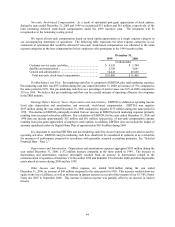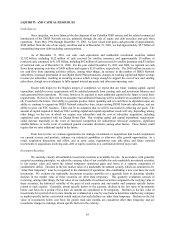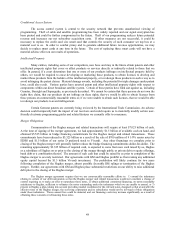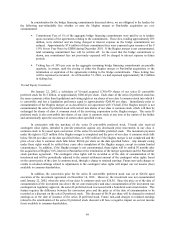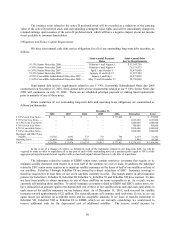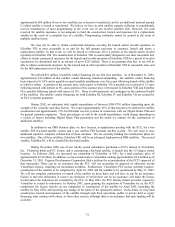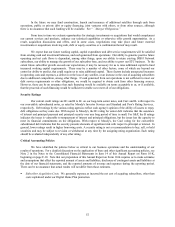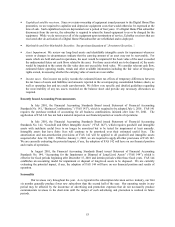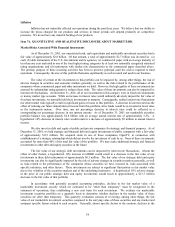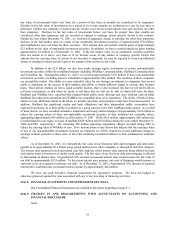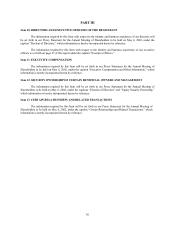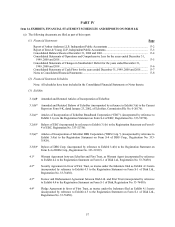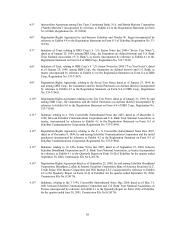Dish Network 2001 Annual Report Download - page 50
Download and view the complete annual report
Please find page 50 of the 2001 Dish Network annual report below. You can navigate through the pages in the report by either clicking on the pages listed below, or by using the keyword search tool below to find specific information within the annual report.48
Conditional Access System
The access control system is central to the security network that prevents unauthorized viewing of
programming. Theft of cable and satellite programming has been widely reported and our signal encryption has
been pirated and could be further compromised in the future. Theft of our programming reduces future potential
revenue and increases our net subscriber acquisition costs. If other measures are not successful, it could be
necessary to replace the credit card size smart card that controls the security of each consumer set top box at a
material cost to us. In order to combat piracy and to generate additional future revenue opportunities, we may
decide to replace smart cards at any time in the future. The cost of replacing these smart cards will not have a
material adverse effect on our results of operations.
Intellectual Property
Many entities, including some of our competitors, now have and may in the future obtain patents and other
intellectual property rights that cover or affect products or services directly or indirectly related to those that we
offer. In general, if a court determines that one or more of our products infringes on intellectual property held by
others, we would be required to cease developing or marketing those products, to obtain licenses to develop and
market those products from the holders of the intellectual property, or to redesign those products in such a way as to
avoid infringing the patent claims. Material damage awards, including the potential for triple damages under patent
laws, could also result. Various parties have asserted patent and other intellectual property rights with respect to
components within our direct broadcast satellite system. Certain of these parties have filed suit against us, including
Gemstar, Starsight and Superguide, as previously described. We cannot be certain that these persons do not own the
rights they claim, that our products do not infringe on these rights, that we would be able to obtain licenses from
these persons on commercially reasonable terms or, if we were unable to obtain such licenses, that we would be able
to redesign our products to avoid infringement.
Certain Gemstar patents are currently being reviewed by the International Trade Commission. An adverse
decision could temporarily halt the import of our receivers and could require us to materially modify certain user-
friendly electronic programming guides and related features we currently offer to consumers.
Merger Obligations
Consummation of the Hughes merger and related transactions will require at least $7.025 billion of cash.
At the time of signing of the merger agreement, we had approximately $1.5 billion of available cash on hand, and
obtained $5.525 billion in bridge financing commitments for the Hughes merger and related transactions. These
commitments have been reduced to $3.325 billion as a result of the sale of $700 million of 9 1/8% senior notes by
EDBS and $1.5 billion of our series D preferred stock to Vivendi. Any other financings we complete prior to
closing of the Hughes merger will generally further reduce the bridge financing commitments dollar-for-dollar. The
remaining approximately $3.325 billion of required cash, is expected to come from new cash raised by us, Hughes
or a subsidiary of Hughes on or prior to the closing of the merger through public or private debt or equity offerings,
bank debt or a combination thereof. The amount of such cash that could be raised by us prior to completion of the
Hughes merger is severely restricted. Our agreements with GM and Hughes prohibit us from raising any additional
equity capital beyond the $1.5 billion Vivendi investment. The prohibition will likely continue for two years
following completion of the Hughes merger, absent possible favorable IRS rulings or termination of the Hughes
merger. Further, our agreements with GM and Hughes place substantial restrictions on our ability to raise additional
debt prior to the closing of the Hughes merger.
The Hughes merger agreement requires that we use commercially reasonable efforts to: 1) amend the indentures
relating to certain of our debt instruments so that the Hughes merger and related transactions would not constitute a change of
control requiring us to make an offer to repurchase those notes, 2) obtain additional committed financing, on terms reasonably
satisfactory to Hughes, sufficient to refinance the notes outstanding under the indentures which we are unable to amend, or 3)
present to Hughes a plan, taking into account prevailing market conditions for the relevant notes, designed so that at and after the
effective time of the Hughes merger, the surviving corporation and its subsidiaries would not be in breach of their obligations
under those indentures. These consent fees could be material, and our financing costs may increase significantly as a result of
obtaining these consents or refinancing these notes.


